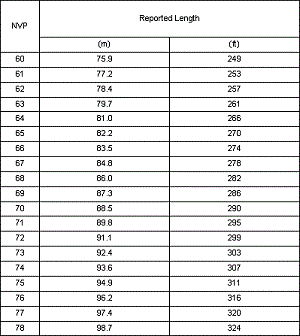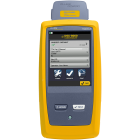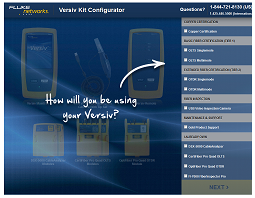テスターに NVP が間違って設定されている - 問題ありません
Do not get hung up on length, attenuation is the critical factor. Please read the following carefully.
- The NVP of the cable can also vary in manufacturer by up to 2%.
- The NVP setting affects the length measurement and NO other parameter.
- The table below gives you an indication of the additional inaccuracy created on a maximum length with the incorrect setting for NVP.
Cable Length vs. NVP

If you have selected a TIA Standard, the length test will not fail until the prescribed length plus ten percent has been exceeded.
If you are measuring a Permanent Link which has a limit of 90 meters, the length test will not fail unless the measured length is greater than 99 meters (90 meters + 10%).
ANSI/TIA-1152
2.3.1 Physical length vs. electrical length
The pass or fail criteria is based on the maximum length allowed for the channel or permanent link as specified in ANSI/TIA-568-C.2 plus the nominal velocity of propagation (NVP) uncertainty of 10 %.
If you have selected an ISO or EN Standard, length is not required for compliance. You cannot therefore fail on length.
The active equipment is not concerned about the physical length, only that the attenuation, propagation delay and delay skew are within specification. This is why length is not a requirement in ISO/IEC 11801:2002.
|
Transmission parameter b |
Testing for |
||
|
Reference conformance testing |
Installation conformance testing |
||
|
リターン・ロス |
無 |
無 |
|
|
挿入損失 |
無 |
無 |
|
|
Pair-to-pair NEXT |
無 |
無 |
|
|
PS NEXT |
C |
C |
|
|
Pair-to-pair ACR-N |
C |
無 |
|
|
PS ACR |
C |
C |
|
|
Pair-to-pair ACR-F |
無 |
無 |
|
|
PS ACR-F |
C |
C |
|
|
Direct current (d.c.) loop resistance |
無 |
無 |
|
|
Direct current (d.c.) resistance unbalance |
無 |
I |
|
|
伝搬遅延 |
無 |
無 |
|
|
遅延スキュー |
無 |
無 |
|
|
Unbalance attenuation, near-end (TCL) |
無 |
I |
|
|
Unbalance attenuation, far-end (ELTCTL) |
無 |
I |
|
|
Coupling attenuation |
無 |
I |
|
|
PS ANEXT |
無 |
NS |
|
|
PS ANEXTavg |
C |
C |
|
|
PS AACR-F |
無 |
NS |
|
|
PS AACR-Favg |
C |
C |
|
|
ワイヤーマップ |
無 |
無 |
|
|
Continuity of conductors, screens (if applicable), short and open circuits |
無 |
無 |
|
|
Lengtha |
I |
I |
|
|
where |
|||
|
NOTE The term “met by design” refers to a requirement which may be met by the selection of appropriate materials and installation techniques. |
|||
|
a Length is not a pass/fail criterion. |
|||
In Table B.1 above, the type of test to be carried out for each channel or permanent link is indicated by an "I" (informative) or "N" (normative). Parameters, which are computed from the measured parameters, are indicated by a "C". The tests indicated by I may be carried out as part of an acceptance test. The tests indicated by N shall be carried out as part of an acceptance, reference or compliance test.






